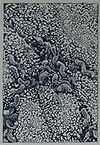Wikipedia:Today's featured article/March 26, 2005
Helicobacter pylori is a bacterium that infects the mucus lining of the human stomach. Many peptic ulcers and some types of gastritis are caused by H. pylori infection, although most humans who are infected will never develop symptoms. The bacterium lives in the human stomach exclusively and is the only known organism that can thrive in that highly acidic environment. It is helix shaped (hence the name helicobacter) and can literally screw itself into the stomach lining to colonize it. In 1875, German scientists found the bacteria in the lining of the human stomach, although the results were forgotten. The bacterium was rediscovered in 1982 by two Australian scientists Robin Warren and Barry Marshall, who isolated and cultured organisms from mucosal specimens from human stomachs. In their original paper, Warren and Marshall contended that most stomach ulcers and gastritis were caused by colonization with this bacterium, not by stress or spicy food as had been assumed before. The medical community was slow to recognize the role of this bacterium in stomach ulcers and gastritis, but in 1994, the National Institutes of Health published an opinion stating that most recurrent gastric ulcers were caused by H. pylori, and recommended that antibiotics be included in the treatment regimen. (more...)
Recently featured: Military history of the Soviet Union – History of the Yosemite area – Pioneer Zephyr

